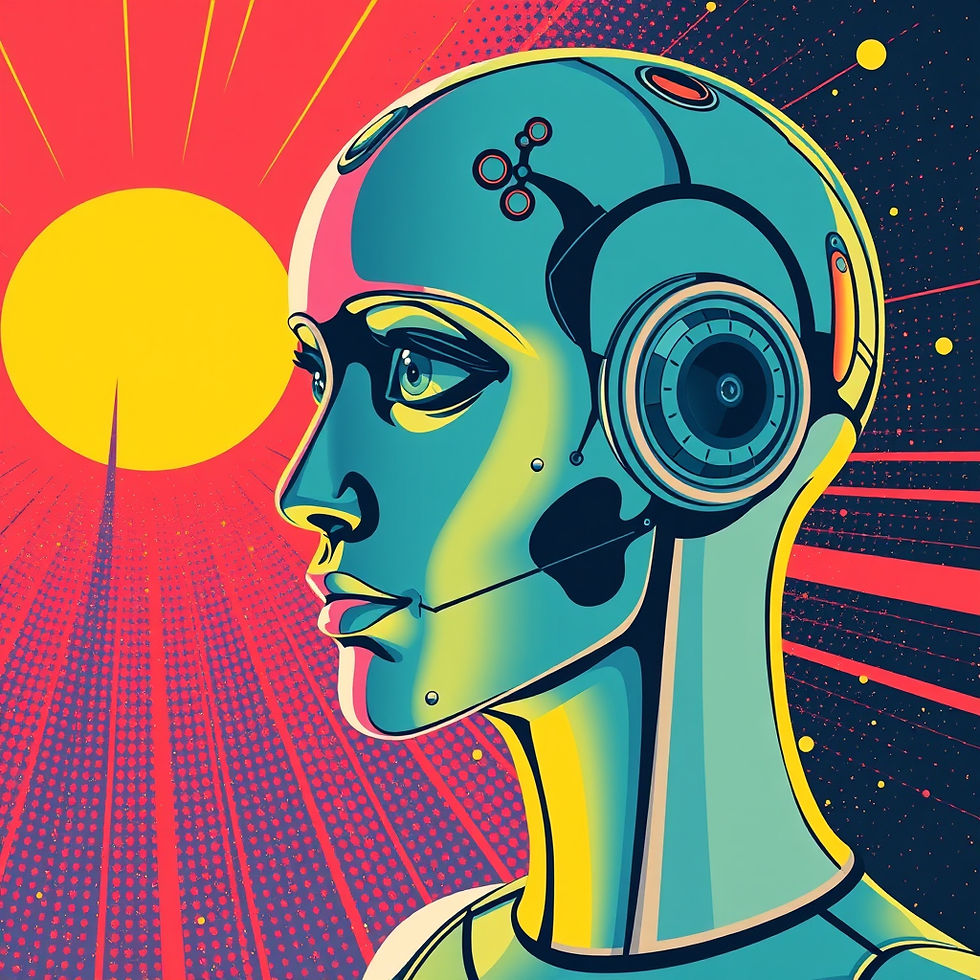Algorythm / disrupting Industries thru the power of emotions
- Kat Usop

- Oct 11, 2024
- 4 min read
In a world where technology increasingly shapes human interactions, emotion AI—a branch of artificial intelligence that detects, analyzes, and responds to human emotions—has become a game-changer across various industries. While traditional AI focuses on logic and pattern recognition, emotion AI bridges the gap between machines and human sentiment. This advancement is reshaping industries by enhancing customer experiences, improving mental health care, and optimizing workplace productivity. Let’s explore how emotion AI is revolutionizing key sectors and the profound implications of this shift.
CUSTOMER EXPERIENCE AND RETAIL
Emotion AI is redefining how businesses engage with their customers. By integrating emotional intelligence into customer service platforms, companies can gauge a person’s mood and emotional state during interactions, ensuring personalized responses that resonate on a deeper level. Consider virtual assistants that not only address a customer’s query but also detect frustration from the tone of voice or word choice. With these cues, the system can adjust its approach, offering empathy-driven solutions.
For instance, retailers are leveraging emotion AI in physical stores with smart cameras and facial recognition software to analyze customer emotions as they browse. If shoppers appear confused or dissatisfied, in-store assistants can be alerted to offer immediate help. In online settings, emotion AI monitors user interactions with websites, such as hesitation or frustration when navigating, and makes real-time adjustments to improve the experience, thus boosting satisfaction and conversion rates.
MENTAL HEALTH CARE AND THERAPY
The rise of emotion AI is particularly promising for the mental health industry, where human emotions are at the core of care. Emotion AI tools analyze speech patterns, facial expressions, and even text to identify signs of anxiety, depression, or other mental health concerns. By recognizing these subtle emotional indicators, therapists can intervene earlier and provide more effective support.
AI-powered mental health apps are already making strides in offering accessible care to those who may not seek traditional therapy. These platforms analyze user input—whether spoken, written, or visual—and provide feedback, exercises, or escalate cases to human counselors when necessary. Beyond just tracking emotional trends, emotion AI can deliver context-sensitive insights, like whether a user is improving over time or experiencing increased stress. This level of personalization was previously only possible with consistent human interaction, but emotion AI is now filling that gap, offering scalable and timely care.
HUMAN RESOURCES AND WORKPLCE PRODUCTIVITY
Workplace dynamics are shifting with the integration of emotion AI, as companies seek new ways to enhance employee engagement and well-being. In HR, emotion AI tools are used to analyze employee feedback during performance reviews, gauging underlying sentiments that might not be immediately expressed. Employers can gain insights into morale, identify potential burnout, and offer tailored support to those struggling.
In meetings, AI-driven tools can analyze group dynamics, evaluating who is contributing most, who seems disengaged, or who might be under stress. This helps leaders foster a more inclusive and emotionally balanced environment. Furthermore, emotion AI enhances remote work environments by analyzing video calls and emails to maintain a pulse on employee satisfaction. Such insights allow management to address issues proactively, keeping teams motivated and productive.
ENTERTAINMENT AND MEDIA
The entertainment industry is also embracing emotion AI to create more immersive and emotionally engaging experiences. Streaming platforms are already using AI to suggest content based on viewing patterns, but the next wave of technology goes a step further. By analyzing the viewer’s facial expressions or reactions, emotion AI can recommend content that matches their emotional state—whether they need something uplifting after a long day or calming during stressful times.
In gaming, emotion AI adjusts difficulty or narrative paths based on the player’s real-time emotions. Players might find a challenge that adapts to their level of engagement or frustration, ensuring a personalized and enjoyable experience. As a result, gaming companies are creating more dynamic, responsive games that resonate on a deeper emotional level with users.
HEALTHCARE AND PATIENT CARE
In the healthcare sector, emotion AI is proving invaluable in patient care, particularly for elderly or vulnerable individuals. Remote monitoring tools equipped with emotion AI can track not only physical health metrics but also emotional well-being. This is especially beneficial for patients who may be unable to express their feelings or for those with cognitive impairments.
For instance, wearable devices that track heart rate, speech patterns, and facial expressions can alert caregivers when a patient might be experiencing distress, anxiety, or discomfort. Hospitals are also implementing emotion AI to monitor patient satisfaction and emotional states during their stays, ensuring that care is more personalized and responsive.
THE FUTURE OF EMOTION AI
As emotion AI becomes more sophisticated, it will continue to reshape industries in ways we are only beginning to comprehend. While the technology brings enormous benefits, from personalized customer experiences to improved mental health care, it also raises questions about privacy and ethics. How will companies ensure that the data they collect on emotional states is used responsibly? How do we strike a balance between harnessing these insights and respecting individual privacy?
Nevertheless, one thing is certain: emotion AI is not just a fleeting trend—it is a fundamental shift in how we interact with technology and how technology, in turn, understands us. As industries continue to adopt and refine these tools, the line between human emotion and machine intelligence will blur, ushering in a future where technology understands us not only rationally but emotionally.
Emotion AI is paving the way for a world where interactions with machines feel more human, more intuitive, and ultimately, more empathetic. It is this empathy, powered by technology, that promises to disrupt industries and reshape the way we live, work, and interact.



Comments